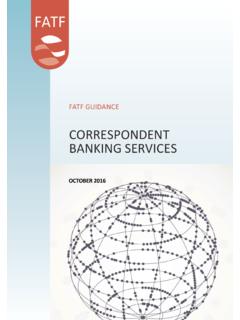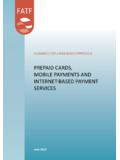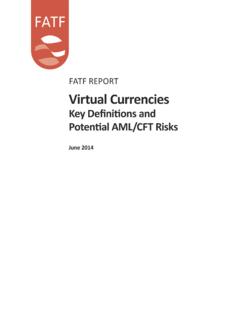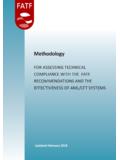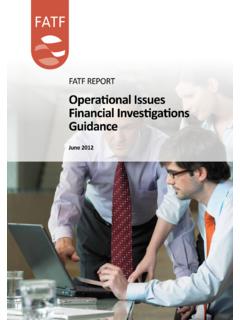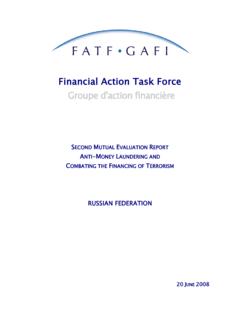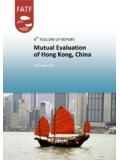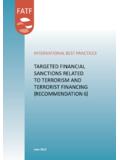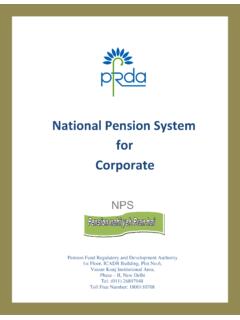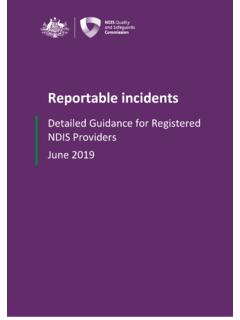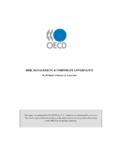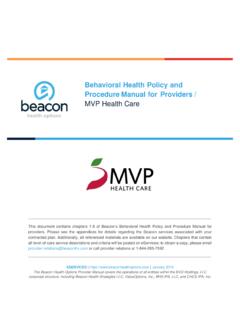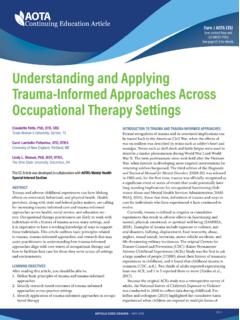Transcription of Money Laundering Using Trust and Company Service Providers
1 Money Laundering Using Trust and Company Service Providers October 2010 CARIBBEAN FINANCIAL ACTION TASK FORCE FINANCIAL ACTION TASK FORCE GROUPE D ACTION FINANCI RE FATF Report THE FINANCIAL ACTION TASK FORCE (FATF) The Financial Action Task Force (FATF) is an independent inter-governmental body that develops and promotes policies to protect the global financial system against Money Laundering and terrorist financing. Recommendations issued by the FATF define criminal justice and regulatory measures that should be implemented to counter this problem. These Recommendations also include international co-operation and preventive measures to be taken by financial institutions and others such as casinos, real estate dealers, la wyers and accountants.
2 The FATF Recommendations are recognised as the global anti- Money Laundering (AML) and counter-terrorist financing (CFT) standard. For more information about the FATF, please visit the website: THE CARIBBEAN FINANCIAL ACTION TASK FORCE The Financial Action Task Force (FATF) is an independent inter-governmental body that develops and promotes policies to protect the global financial system against Money Laundering and terrorist financing. Recommendations issued by the FATF define criminal justice and regulatory measures that should be implemented to counter this problem.
3 These Recommendations also include international co-operation and preventive measures to be taken by financial institutions and others such as casinos, real estate dealers, lawyers and accountants. The FATF Recommendations are recognised as the global anti- Money Laundering (AML) and counter-terrorist financing (CFT) standard. For more information about the CFATF, please visit the website: 2010 FATF/OECD and CFATF. All rights reserved. No reproduction or translation of this publication may be made without prior written permission. Applications for such permission, for all or part of this publication, should be made to the FATF Secretariat, 2 rue Andr Pascal 75775 Paris Cedex 16, France (fax +33 1 44 30 61 37 or e-mail: Money Laundering Using Trust and Company Service Providers - October 2010 2010 FATF/OECD and CFATF - 1 TABLE OF CONTENTS TABLE OF ABBREVIATIONS AND ACRONYMS.)
4 3 EXECUTIVE SUMMARY .. 4 CHAPTER 1: INTRODUCTION AND BACKGROUND .. Introduction .. Need for Typology .. Scope .. Methodology .. Structure and Nature of the Sector .. Overview of previous work .. Current complementary work .. The Project .. 13 CHAPTER 2: ANALYSIS OF QUESTIONNAIRE RESPONSES .. 14 Definition of TCSP .. services generally provided by TCSPs .. Persons who can act as TCSPs .. Use of a TCSP for incorporation/registration of a Company .. Licensing and Supervision of TCSPs .. Information required to be gathered by TCSPs .. Vulnerabilities faced by TCSPs .. TCSP s role in detection and investigation of Money Laundering .
5 Adequacy of international standards pertaining to TCSPs .. 27 CHAPTER 3: ANALYSIS OF Money Laundering TYPOLOGIES .. 30 Money Laundering Threats .. Countering the Money Laundering Threats .. 42 CHAPTER 4: KEY FINDINGS .. 46 Description of Money Laundering Vulnerabilities/Observations .. Other Findings .. Money Laundering Indicators .. 48 CHAPTER 5: CONCLUSIONS .. 50 CHAPTER 6: ISSUES FOR CONSIDERATION .. 52 Policy Considerations .. 52 Areas for Further Work .. 53 REFERENCES .. 56 JURISDICTIONS THAT RESPONDED TO THE 57 ALPHABETICAL LISTING OF COUNTRY ABBREVIATIONS .. 57 ANNEX I - TABLES .. 58 ANNEX II ADDITIONAL CASES.
6 68 ANNEX III QUESTIONNAIRE .. 74 ANNEX IV OGBS STATEMENT OF BEST PRACTICE .. 94 Money Laundering Using Trust and Company Service Providers - October 2010 2 - 2010 FATF/OECD and CFATF Money Laundering Using Trust and Company Service Providers - October 2010 2010 FATF/OECD and CFATF - 3 TABLE OF ABBREVIATIONS AND ACRONYMS AML/CFT Anti- Money Laundering /Counter-Terrorism Financing CDD Customer due diligence CFATF Caribbean Financial Action Task Force CSP Company Service provider G-20 Group of Twenty Finance Ministers and Central Bank Governors FATF Financial Action Task Force FSF Financial Stability Forum IAIS International Association of Insurance Supervisors IOSCO
7 International Organisation of Securities Commissions KYC Know your customer ML/FT Money Laundering /Financing Terrorism OECD Organisation for Economic Co-operation and Development OGBS Offshore Group of Banking Supervisors PEP Politically Exposed Person RBA Risk Based Approach SAR Suspicious Activity Report STR Suspicious Transaction Report TCSP Trust and Company Service provider TSP Trust Service provider WGEI Working Group on Evaluations and Implementation (FATF Working Group) Money Laundering Using Trust and Company Service Providers - October 2010 4 - 2010 FATF/OECD and CFATF EXECUTIVE SUMMARY 1. Trust and Company Service Providers (TCSPs) play a key role in the global economy as financial intermediaries, providing an important link between financial institutions and many of their customers.
8 They provide often invaluable assistance to clients in the management of their financial affairs and can therefore significantly impact transactional flows through the financial system. 2. There have been a number of studies over the years which highlight the use of legal persons and legal arrangements to facilitate Money Laundering . Little information is available at the current time with regard to the use of such structures in the financing of terrorism but this does not mean that such vehicles have not or cannot be used in this regard. Therefore, although the research provided will centre on the role that TCSPs have played with regard to combating Money Laundering , it is hoped that this report will be of value in relation to the fight against both Money Laundering and terrorist financing.
9 3. TCSPs are often involved in some way in the establishment and administration of most legal persons and arrangements; and accordingly in many jurisdictions they play a key role as the gatekeepers for the financial sector. This report provides a number of case studies which demonstrate that TCSPs have often been used, wittingly or unwittingly, in the conduct of Money Laundering activities. The following factors are borne out by the case studies as contributing to the crime of Money Laundering :- Weak or ineffective Anti- Money Laundering /Counter-Terrorism Financing (AML/CFT) frameworks in some jurisdictions, in areas which can impact the operation of TCSPs; The presence in the TCSP sector of persons that are willing to get involved in or to perpetrate criminal activities.
10 And The proliferation of TCSPs whose management/staff do not have the required expertise, knowledge or understanding of key matters that are relevant to the operation of their business, such as their clients affairs. This lack of knowledge and skill can promote and facilitate illegal activities. 4. In this regard, it is important to note that a number of jurisdictions have chosen not to recognise or put in place an AML/CFT supervisory framework for the TCSP sector because of the nature of their legal systems. However, there are still persons in those jurisdictions that are carrying out, as a business, the activities that can be attributed to this sector.
